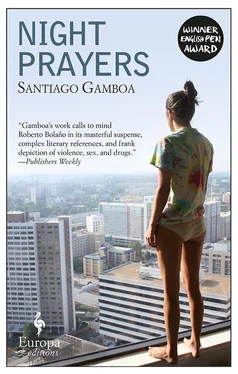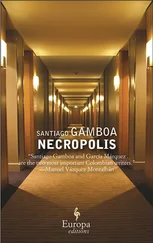“Didn’t you tell me the young man had agreed?” the lawyer asked angrily, clearly blaming me. “That you’d explained to him what was at stake?”
I was stunned.
I told him I had, but that something had probably changed inside him. I assumed that on learning about Juana and the child his desire to be free had revived. Even though that freedom was utopian and unrealizable.
“And now what do we do?” the lawyer asked. “I remind you that your countryman can be tried under article 27, the old military law with an immediate death penalty, and they don’t even have to wait until the end of the trial. Actually they don’t need a trial at all, just an order from the prosecutor’s department. I told him: from now on they can finish this at any moment. It’s very serious, what can we do?”
I found it strange that he should ask me that question (which of the two of us was the lawyer with important contacts in Bangkok?) but I preferred not to get into an argument, so I said to him:
“For now, defend him, do everything you can to defend him and get him acquitted. It’s the only option.”
“I’ve already told you that isn’t realistic,” the lawyer insisted, still nervous, or rather annoyed, as if I had deceived him.
I hung up angrily and called Colombia, but… The damned time difference! I had to wait four hours. At last, at around six-thirty, I managed to talk with the Consular Department. I told them it was urgent that I travel to Bangkok, that the trial had begun that morning, without warning. I couldn’t tell them my principal idea, which was to ask Juana to persuade Manuel to plead guilty and gain time. I wasn’t sure that could still be done, but it was the only way out. The famous lawyer wasn’t going to be of much use.
When they saw the file in Bogotá, they told me that if the lawyer had the situation in hand, it wasn’t urgent for me to travel, but that they’d set the procedure for a new mission in motion anyway, in anticipation of the next hearing.
I preferred not to say anything to Juana until I had a specific date and a reply from the Ministry, so that night I gave her the excuse that I had a diplomatic engagement, which was actually true: a reception at the Bulgarian Embassy. And that’s where I went, in the district of Chanakyapuri, and was able to discreetly drown my nerves in vodka and rakia and eat Tarator soup and some splendid sausages.
I got home late and fortunately they were both asleep. I had a last gin sitting on the bed, inside the mosquito net, thinking and thinking. I would have to act fast. The next day I called Bangkok, but wasn’t able to reach the lawyer until the afternoon. He told me they’d heard the testimonies of the police officers who had made the arrest and that the next hearing would be in three days. I asked him to keep me informed of the slightest development.
Then I called Teresa at the Mexican embassy and told her everything. She was pleased to hear my voice, and offered to help:
“Don’t worry, I’ll try to go to the next hearing with the lawyer, do you think you’ll be able to come?”
“I’m working on it, but without a green light from the Ministry I can’t move. You know how it is.”
After three days the travel authorization from the Consular Department still hadn’t arrived, so I decided to ask for leave and pay for the tickets myself. When I told Juana what was happening she looked worried and a tear ran down her cheek. She gave Manuelito Sayeq a big hug, lifted him up, and sang something into his ear. The child didn’t cry much, he seemed very peaceful, unlike the two of us. That same night we got on the plane. The child was asleep.
I explained to her how vital it was that Manuel plead guilty and she understood that without having to think too much about it.
“It’s crazy not to have done it from the start,” she said, “but don’t worry, Consul, I’ll talk to him and persuade him.”
Teresa was waiting for us at the airport, at two in the morning. Oh, those night flights. She gave me a big hug, and I introduced her to Juana and little Manuel Sayeq.
“I wasn’t able to speak with the lawyer yesterday,” Teresa said. “I did go to the court, but they wouldn’t let me in. To be honest, I’m not really sure what’s going on.”
We got to the apartment in the middle of the night — Teresa had offered to put us up and I’d accepted — and we arranged the guest room for the boy. I would sleep on the couch. It was almost four but nobody seemed very sleepy, so Teresa suggested we have a drink.
“I thought you’d never ask,” I said.
She brought out a bottle of Herradura and we started drinking with a certain desperation, as if it were the antidote to a dangerous bite. Then I opted to withdraw and listen to Teresa and Juana asking each other questions, telling stories, getting to know each other.
A Colombian sociologist of thirty-one (how old was she, actually?) with a life of loss, flight, hate, an unconventional, tragic adventure, which hadn’t made her resentful but quite the contrary, someone full of life, a strong, hopeful woman, capable of withstanding any hurricane, and next to her Teresa, forty-something, divorced, the mother of two daughters, a comfortable life, and more conventional except for the slightly unconventional aspect of her liking for strong liquor, a diplomat, living a privileged existence in a Southeast Asian country, with a lot of nostalgia and at the same time the desire (perhaps) to meet someone (isn’t that what everyone wants? what we all want?), always thinking of the future.
I closed my eyes and fell asleep, not knowing what time it was, and when I woke I was lying on the couch, with clean sheets (smelling fresh, of lavender), and a nice pair of pajamas that weren’t mine! (Teresa explained that they hadn’t been able to open my case and hadn’t wanted to wake me, so she’d gotten out a pair belonging to her father, who had left them behind after a recent visit.)
Dawn was breaking.
2. INTER-NETA’S MONOLOGUES
Today, Death paid me a visit.
Before, my life was a feast at which all hearts opened, and all wines flowed from glass to glass, from mouth to mouth.
One of those nights, I felt Death on my knees and found him bitter. I cursed him.
“Oh, Death, come and take away the thought of Death,” I read in an old book.
“When me they fly I am the wings,” he replied, from another poem.
I summoned all my strength. I planted myself in front of him and rejected his terrifying fury. Then I escaped.
Death had a thousand faces. All the faces.
Sometimes it was a young poet gazing at the twilight, in the port of Aden.
Death is here, and oh so punctual.
Lord, your guest is waiting for you in the drawing room.
Entrust my most precious treasures to the witches, to the spirits of poverty, to hate. I have succeeded in banishing any human hope from my soul.
As I already said: today Death paid me a visit. Death, the Grim Reaper.
Death who never rests from his labors, from his sleeplessness. Who loves us and passes between us like a wind, a venticello , a slow, dense music, a dark cloud.
I called to my executioners to raise their rifles, I summoned all the plagues to drown me in their sand or their blood.
Unhappiness was my god. My one, beloved god.
Then I lay down on the dusty soil of Harar and saw the young poet again.
He was writing letters, looking southward. Every now and again he sank his hand into the red earth and let it run between his fingers.
We played with madness (were we fantasizing?) until the afternoon gave my mouth the terrifying smile of the idiot.
But I recovered my appetite, and went back to the parties, to the wine. Death was still there, I could not ignore him.
Читать дальше












